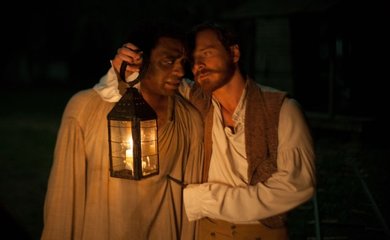Just look at Edwin Epps’ eyes. Shimmering blue hatred ringed with red and sunk into black pits dug out of his cheekbones. The sweat of corruption clings to his sickly yellow skin, he is odious and tyrannical and by a perverted twist of fate completely lawful. His tall frame is wracked with wickedness and alcohol. He has just flayed his favoured slave and concubine Patsey to within an inch of her life, an act of power, vengeance and a warped sense of love. Edwin Epps shows us the cost of slavery to the white ruling class in America’s Southern states, the moral squalor that sucks away the very marrow of his humanity.
Minutes earlier Epps had handed the lash to another slave, Solomon Northup to administer his punishment. Solomon can’t summon up the hatred necessary despite a pistol held to his head. So punishment is too flimsy a word for what Patsey endures. Punishment is for schools and naughty children. This is crushing debasement, the annihilation of body and soul of one human being by another. Although some would say that human being is too flimsy a description for Epps. Solomon is aghast, apoplectic, screaming, “Thou devil! Sooner or later, somewhere in the course of eternal justice thou shalt answer for this sin!”
But of course we must remember that Epps is a man, not a devil, even when he regurgitates his foul response to Solomon, “No sin! There is no sin! A man does how he pleases with his property.” We must remember that normal men when sponsored by the state, supported by institutional evil can commit despicable acts of cruelty, of murder, of genocide. We must remember that Epps is a man, a married man, and a businessman because to dress him up like a demon prince presiding over his plantation of hell is to make him a vile cartoon. Epps like the Nazis must be human otherwise we are in danger of liberal complacency, comfortable that reality will never again become so heinous.
Steve McQueen is a director that specializes in bodies. Bodies as commodities, as political weapons, as cold sexual vassals. Bodies to be broken, to smear protest, secrete sedition and to self-harm. McQueen revealed the bloody-minded trauma required of Bobby Sands’ body as he starved himself to death in “Hunger.” He revealed the hollow fascination, the self-destructive streak that drives sex-addiction in “Shame.” In “12 Years a Slave” Solomon begins as a free man, an erudite spirit who moves with angelic grace. When he awakes shackled in a dark room, kidnapped and sold into bondage the righteous indignation in his face extends to his entire body, like an immune system failing to reject a fatal poison.
“12 Years a Slave” is Steve McQueen’s third film. Like his famous namesake he registers a cool detachment when it matters. An attempted lynching is filmed from afar; the rest of the plantation ignores a muddy dance of survival at the end of a rope. Epps’ sinister midnight embrace of Solomon is excruciating and Patsey’s torture revealed in one arduous long take. McQueen has opened up his rigorous application of the form with disorientating flashbacks that leave us as dumbfounded at the injustice of Solomon’s capture as he is. Chiwetel Ejiofor as Solomon bursts at the seams trying to hide his intellect away from Michael Fassbender’s frenzied Epps. Both offer extreme performances of men owned by tyranny. What is most unsettling about McQueen’s film is the damage done to Solomon, a man only “12 Years a Slave.”

